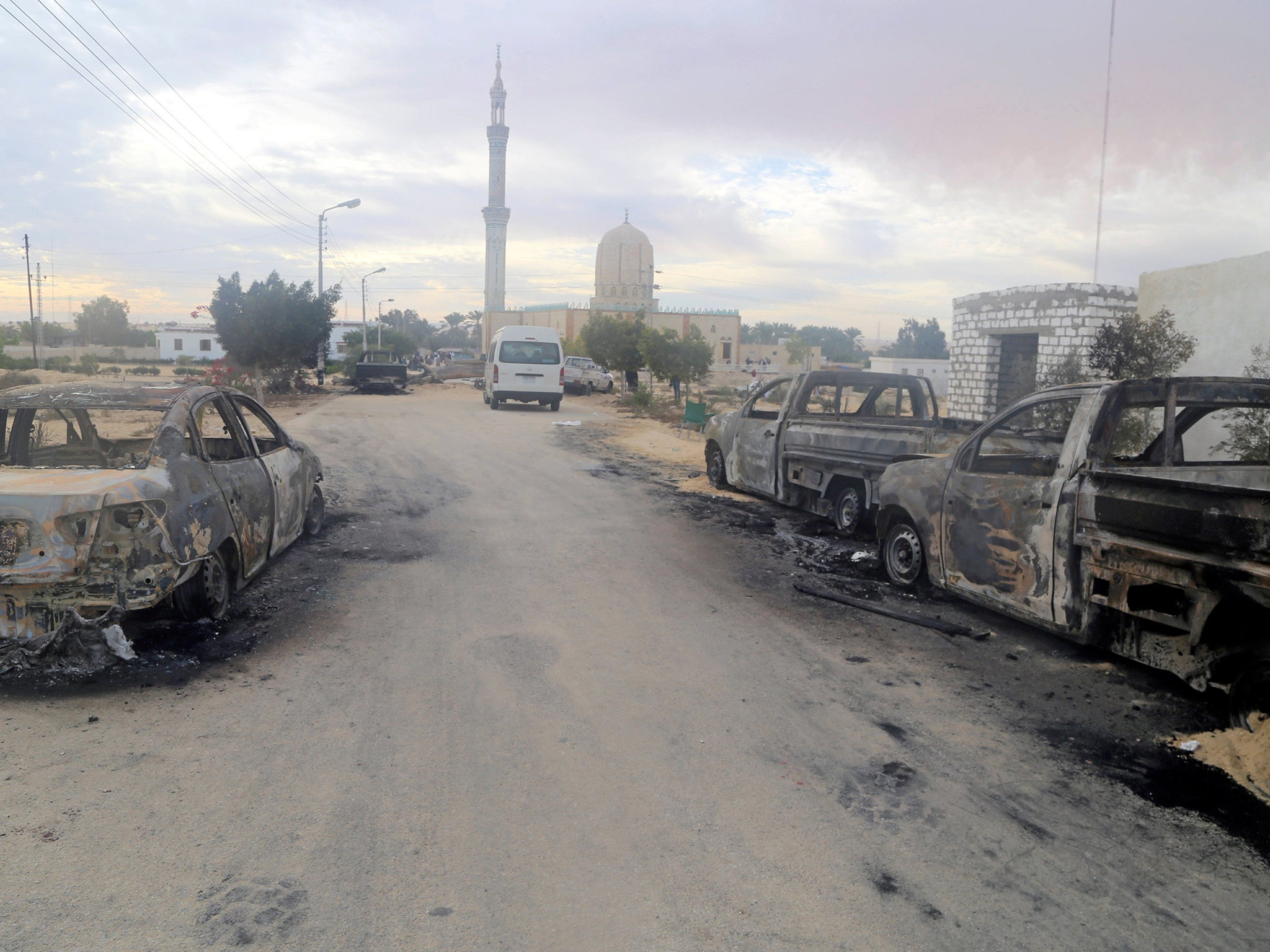Egypt mosque terror attack: Egyptian officials say gunmen were carrying the Isis flag
Public prosecutor's says attackers were carrying terror group's flag as they carried out the deadliest attack by Islamist extremists in Egypt’s modern history

Terrorists were carrying the Isis flag when they killed 305 people in an attack on a Sinai mosque, Egypt’s public prosecutor’s office has stated.
The claim has yet to be independently verified, but it fits the assumptions of many commentators, given that North Sinai is facing an insurgency by jihadists who aligned with Isis in 2014 and now call themselves ‘Sinai State’.
As of Saturday afternoon, no terrorist group has claimed responsibility for what was the deadliest attack by Islamist extremists in Egypt’s modern history.
But the statement from the public prosecutor’s office spoke of between 25 and 30 gunmen in military-style uniforms carrying the flag of Isis as they attacked the al-Rawdah mosque in the village of Bir al-Abed.
"They numbered between 25 and 30, carrying the Daesh [Isis] flag and took up positions in front of the mosque door and its 12 windows with automatic rifles," the statement said.
The public prosecutor’s office said its claim was based on investigation and the testimony of survivors.
Before the statement was issued, one expert told The Independent it was highly likely that Isis affiliates were behind the attack on the mosque, which practises Sufism, a form of Islam regarded as heretical by extremists.
Mohannad Sabry, a Sinai expert and author of Sinai: Egypt’s Linchpin, Gaza’s Lifeline, Israel’s Nightmare, said: “Almost every sign points toward Isis in Sinai.
“They have had a decades-old lethal animosity with the Sufi community in Sinai and have killed several of their most revered clerics over the past years.”
The Isis affiliate “Sinai State” claimed responsibility for the beheading of two Sufi sheikhs in December 2016, accusing them of apostasy and sorcery, and threatened that it would not allow the presence of Sufi orders in Sinai or Egypt. The group has also frequently destroyed Sufi shrines in North Sinai.
Mr Sabry said the mosque attack suggests that the violence in Sinai is not decreasing and that Isis has not been significantly weakened by successive army campaigns.
“It casts major doubt on the claims of success and achievements spread so loudly by [Egypt’s President Abdel Fattah al-Sisi’s] regime and the Egyptian military,” he said.
“This attack hit a geographic area that the military claims is under control, proving that Isis is still maintaining some of its capabilities to mobilise weapons, explosives and fighters despite years of war with one of the biggest and strongest military forces in the Middle East.”
Asked about progress in the fight against terrorism, one military source told The Independent the army was “doing its best” but added: “The terrorists are hiding in between the civilians, that’s the problem.”
Mr Sabry said the “unique and unprecedented attack” sent “a loud message to the North Sinai community that even a Muslim house of worship, as long as it doesn’t pledge allegiance to Isis, is a target.”
There was, Mr Sabry added, another reason for Isis to attack Sufis.
“The Sufi community in North Sinai has definitely succeeded in what billions of dollars and hundreds of lives spent by Egypt’s military could not achieve,” he said. “It powerfully kept thousands of youths away from joining the ranks of Isis and has continued to fight them on social, intellectual and most importantly religious levels.”
Theresa May spoke with Mr Sisi on Saturday and told him the UK "stands ready to help in any way possible following the massacre.
Downing Street said the two leaders agreed that international co-operation was needed to tackle the problem of terrorism.
A spokesman for Number 10 said: "The Prime Minister offered her personal condolences and the condolences of the British people for the barbaric attack that took place at al-Rawdah mosque in north Sinai yesterday."
The attack was a "terrible example of the threat Egypt faces" and "they agreed that terrorism was an international problem and that it was important for countries to work closely together and share expertise to counter the growing threat of terrorism around the world".
"They welcomed continued bilateral co-operation in this area."
Join our commenting forum
Join thought-provoking conversations, follow other Independent readers and see their replies
Comments